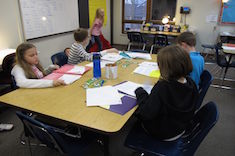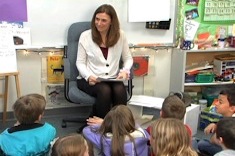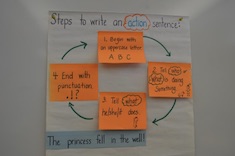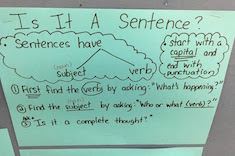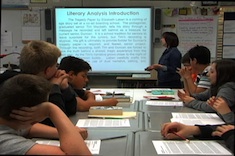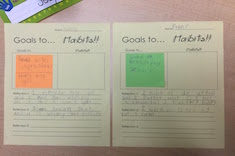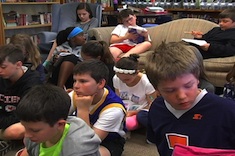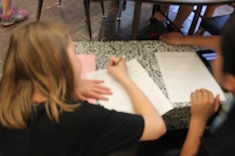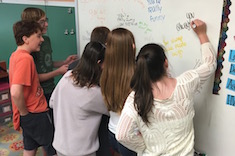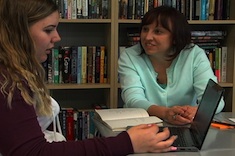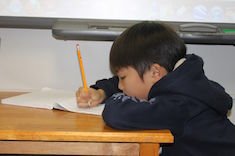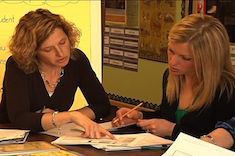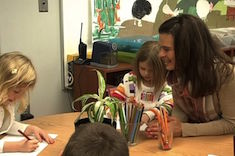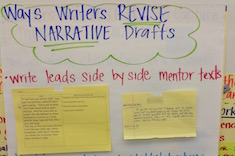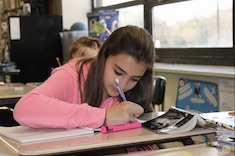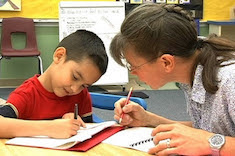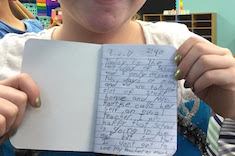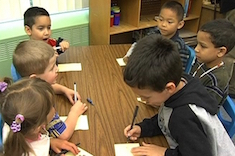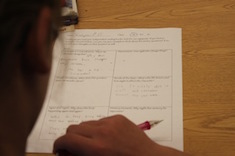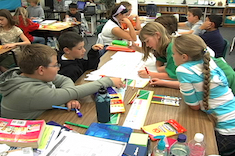Teaching Writing
Everyone who writes for Choice Literacy loves teaching writing, because we all write ourselves. We know it is "hard fun," as Donald Murray famously said—exasperating and exhilarating at the same time. The writing workshops you will read about here and see in our videos are busy, noisy, vibrant places. And most days, we wouldn't want to be anywhere else than in the midst of 'em! Here is where you'll find our latest discoveries, insights, and occasional boneheaded mistakes in teaching writing.
Latest Content
Why We Like Independent Writing Projects
One way to get all students excited about writing workshop is through independent projects. Tara Barnett and Kate Mills explain why they devote many Fridays to independent projects. This is the first installment in a three-part series.
Object Poetry Lesson in Second Grade
Linda Karamatic explores poetry with her second graders. She displays poems students have written and teaches them about fresh language using a poem about a pencil sharpener.
Grammar Instruction in Fourth Grade
Melanie Meehan coaches a fourth-grade teacher who is trying to improve his grammar instruction.
Choose Your Own Grammar Adventure
Gretchen Schroeder shares a quick exercise she’s developed for her high school students to hone grammar and editing skills using online video resources and individual Chromebooks.
Inspiring Students to Revise
Melanie Meehan uses revision strips to move young writers beyond "I'm done!" and into expanding and editing their writing.
How to Write a Sentence
Bitsy Parks realizes charts will help her first graders craft sentences. She shares how her sentence writing charts have changed over time.
An Editing Strategy for Run-On Sentences
Is your problem writers whose sentences never seem to end? Tara Barnett and Kate Mills have a strategy for grappling with run-on sentences.
Writing Workshop Bingo
Carly Ulmer develops a bingo board to use with her middle school students to give them more choice and foster independence while crafting writing in specific genres.
One Text, Many Lessons
Tara Barnett and Kate Mills share how one book can serve as an anchor for lessons on everything from writer’s craft to test-taking skills.
The Importance of Context Minilesson
Christy Rush-Levine uses a vivid anecdote from her youth to teach her middle school students about the importance of context in literary analysis.
Goals to Habits in First Grade
Bitsy Parks finds goals aren’t enough for her first-grade students—real growth requires that the goals eventually become habits. She develops a process mid-year to help children refine their goals step-by-step.
Quick-Write with a Video Prompt
Katherine Sokolowski refreshes the quick-write routine in her fifth-grade classroom by using a video as a prompt.
Independence in Writing Workshop
What's the difference between a sense of calm purpose in writing workshops and an atmosphere fraught with tension? Tara Smith finds in her sixth-grade classroom it's the structures in place (or missing) for student independence.
More Productive Writing Workshops
Melanie Meehan shares how everything from transitions to clutter can provide clues for how to increase student output and enjoyment.
Better Writing Response Groups
Tara Barnett and Kate Mills discover giving “compliments and wishes” aren’t enough when it comes to useful feedback for revision in peer groups. They implement a more structured response process for writing groups.
Teaching Revision in Middle School
Christy Rush-Levine finds her middle school students are adept at planning for writing with notes and visuals, but rarely revise their drafts. She develops a minilesson sequence to help them hone their revision skills.
Focused Revision: Introductions
Gretchen Schroeder focuses solely on revision to introductions in her high school classroom with three fun activities to teach students new possibilities for beginnings.
Writing Empathy
Dana Murphy explains why teachers can have true empathy with student writers only if they write themselves, and chronicles the difference between a typical and an empathetic response in a writing conference.
Making Co-Teaching Work
Kate Mills and Tara Barnett often write together about their experiences as co-teachers. They share their best advice for teachers and school administrators on how to make co-teaching partnerships between classroom teachers and special educators work.
What Writers Need
Mandy Robek commits to two weeks of focused daily writing, and then translates what she learns about what writers need to classroom practice.
Writing Effective Conclusions
Anadiplosis, tricolon, syntax and such — when Gretchen Schroeder's high school students are stuck in rhetorical ruts, she teaches them some new rhetorical tricks for crafting conclusions.
Using Mentor Texts Across the Writing Process
Tara Barnett and Kate Mills describe how they use one mentor text, Owl Moon, to teach multiple lessons on craft during a writing unit.
Assessment Refresh
Christy Rush-Levine considers how her rubrics do not acknowledge different levels of support some students need to accomplish tasks. She rethinks her rubric design to include support, and in the process fosters more independence and reflection in students. Download the assessment rubric.
Tools for Striving Writers
Sometimes a student just. won’t. write. Melanie Meehan shares her favorite tools in her bag of tricks to get the pencil or pen moving across the page.
Moves for Struggling Writers
Here are Matt Renwick's three favorite moves for helping struggling writers.
Assessment During On-Demand Writing
Tara Barnett and Kate Mills combine an engagement inventory and an on-demand writing assessment to get a full picture of skills and habits in their classroom community.
Using Student Checklists in Literacy Intervention
Stephanie Affinito explains how to use student checklists in literacy intervention.
Giving Graphic Organizers a Go
Mary Lee Hahn is skeptical about how her fifth-grade students might use graphic organizers. But once she tries them alongside students, she begins to see their utility.
Gradual Release of Responsibility in Small Groups
Tara Barnett and Kate Mills develop a process of pre-assessment, careful planning, and systematic recordkeeping to up the value of their small groups.
Push Pause: Dealing with Failure in the Midst
Christy Rush-Levine discovers it’s important to “push pause” to deal with failure in the midst of teaching.
Browse Content By
Type
Category
- Assessment Tools
- Big Fresh Archives
- Booklists
- Choice Numeracy
- Classroom Design
- Common Core
- Community Building
- Conferring
- Content Literacy
- Digital Literacy
- English Language Learners
- Equity
- Family Relations
- Free Samples
- Guiding Groups
- Leadership
- Literacy Coaches
- Mentor Texts
- Minilessons
- New Teacher Mentors
- Podcasts
- Poetry
- Quote Collections
- Reading Strategies
- Self Care
- Struggling and Striving Learners
- Talking and Listening
- Teacher Study Groups
- Teaching Reading
- Teaching Writing
- Word Study and Vocabulary
Author
- Melissa Quimby
- Nawal Qarooni
- Gwen Blumberg
- Julie Cox
- The Lead Learners
- Hannah Tills
- Josie Stewart
- Ruth Metcalfe
- Mallory Messenger
- Becca Burk
- Jodie Bailey
- Vivian Chen
- Mary Brower
- Tiffany Abbott Fuller
- Stephanie Affinito
- Ruth Ayres
- Leigh Anne Eck
- Heather Fisher
- Shari Frost
- Julie Johnson
- Suzy Kaback
- Gigi McAllister
- Shirl McPhillips
- Melanie Meehan
- Cathy Mere
- Debbie Miller
- Tara Barnett and Kate Mills
- Tammy Mulligan
- Dana Murphy
- Bitsy Parks
- David Pittman
- Brenda Power
- Heather Rader
- Matt Renwick
- Mandy Robek
- Christy Rush-Levine
- Gretchen Schroeder
- Jen Schwanke
- Brian Sepe
- Katherine Sokolowski
- Stella Villalba
- Jennifer Vincent
Grade Level
Choice Literacy Membership
Articles
Get full access to all Choice Literacy article content
Videos
Get full access to all Choice Literacy video content
Courses
Access Choice Literacy course curriculum and training

